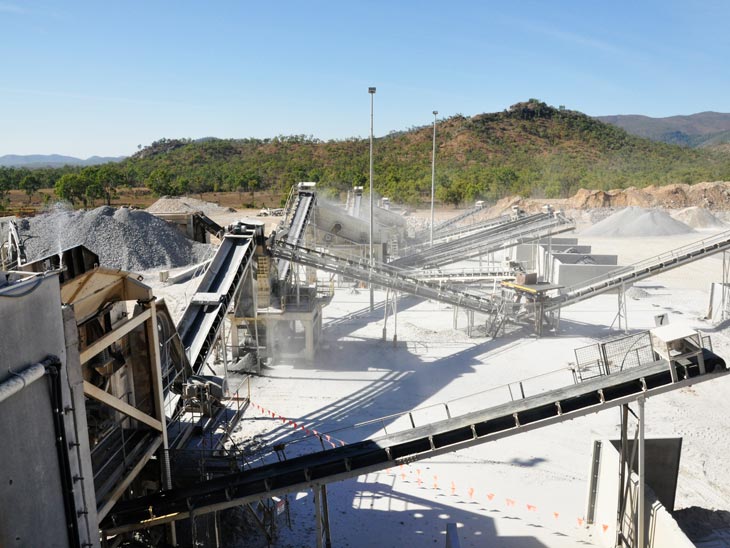
 WhatsApp
WhatsApp [email protected]Get PriceGet Quotation
[email protected]Get PriceGet Quotation
Crushing equipment plays a crucial role in the crushing production line as it is responsible for reducing the size of large rocks and stones into smaller, more manageable pieces. The type of crushing equipment chosen will depend on the nature of the materials to be crushed and the desired end product.
Jaw crushers are commonly used in crushing production lines due to their ability to crush tough and abrasive materials. They work by compressing the material between two plates (jaws), one of which is fixed and the other of which moves back and forth relative to the first. This motion causes the material to be crushed as it is squeezed between the two plates. Jaw crushers can be found in a variety of sizes and capacities, making them suitable for a wide range of applications.
Cone crushers are similar in design to jaw crushers, but they are designed to crush materials by squeezing them between a conical-shaped mantle and a bowl-shaped liner. They are typically used in secondary and tertiary crushing stages, where the material has already been reduced in size by a primary crusher. Cone crushers are highly efficient and are capable of producing a fine end product, making them ideal for use in the production of aggregate and other industrial minerals.
Impact crushers work by using high-speed rotating hammers to impact the material, causing it to break apart into smaller pieces. They are typically used in primary and secondary crushing stages, and are particularly well suited to processing materials that are soft or have low abrasion resistance.
Gyratory crushers are similar in design to cone crushers, but they are designed to crush materials by using a rotating mantle that is mounted on a vertical shaft. The mantle rotates and the material is crushed as it is fed into the crushing chamber. Gyratory crushers are typically used in large-scale mining and aggregate processing operations, where a large amount of material needs to be crushed quickly and efficiently.
Roll crushers are typically used in the crushing of medium-hard materials such as coal, limestone, and clay. They work by compressing the material between two rolls, one of which is fixed and the other of which rotates. Roll crushers are typically found in coal and lignite mines, as well as in aggregate and mineral processing operations.
Hammer mills are used in a variety of crushing production lines, especially when processing soft or low abrasion materials. They work by using high-speed rotating hammers to impact the material and break it into smaller pieces. Hammer mills are commonly used in a variety of industrial applications, including the production of animal feed, wood pellets, and various other materials.
There are many types of crushing equipment available for use in crushing production lines, each with its own unique set of features and benefits. The choice of which equipment to use will depend on the nature of the materials to be crushed and the desired end product. Regardless of the type of equipment chosen, it is important to select high-quality equipment that is built to last and is capable of delivering the desired results efficiently and effectively.
Selecting an optimal crusher can greatly impact the efficiency and productivity of a crushing plant.
Feed Material Characteristics
One of the first things to consider when selecting a crusher is the characteristics of the feed material. This includes the size, hardness, and abrasiveness of the material. The feed material affects the crusher selection as different crushers have different capabilities and limitations. For example, a jaw crusher is best suited for feed materials that are less abrasive, while a cone crusher is more suitable for materials that are harder and more abrasive.
Production Requirements
The production requirements are another important factor to consider when selecting a crusher. This includes the desired output size, the desired production rate, and the capacity of the crushing plant. Selecting a crusher that is not capable of meeting the production requirements can result in decreased efficiency and productivity.
Available Space
The available space in the crushing plant is also a crucial factor to consider when selecting a crusher. Different crushers have different sizes and shapes, so it’s important to ensure that the selected crusher will fit in the designated space.
Maintenance Requirements
The maintenance requirements of a crusher are also an important factor to consider. Crushers that require frequent maintenance can increase the costs of operating a crushing plant. Selecting a crusher with low maintenance requirements can help reduce these costs.
Capital Costs
The capital costs of a crusher, including the purchase price and installation costs, are also a key factor to consider. While more expensive crushers may have higher production rates, they may also have higher capital costs. It’s important to consider the costs of ownership over the lifespan of the crusher when making a selection.
Operating Costs
The operating costs of a crusher, including energy consumption and wear and tear, are also important factors to consider. Selecting a crusher that is energy efficient and has low wear and tear costs can help reduce operating costs.
Environmental Considerations
The environmental impact of a crusher is also an important factor to consider. Crushers that emit high levels of dust and emissions can have a negative impact on the environment. Selecting a crusher that is environmentally friendly can help minimize the environmental impact of a crushing plant.
Safety Considerations
Safety is always a top priority when selecting a crusher. Crushers that have high levels of vibration or are prone to malfunctions can pose a safety risk to workers. Selecting a crusher that is safe and reliable can help ensure a safe working environment.
We have jaw crushers, impact crushers, cone crushers, sand makers and so on.
Mon - Sun, 0:00 - 24:00
24h Online Service
© Zenith. All Rights Reserved. Designed by